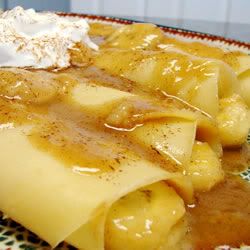We made crepes.

This photo and recipe is from here.
They turned out very well! I also made some delicious applesauce on Tuesday night, and last night, after shopping, cooked down 3 cans of pineapple with some maraschino cherries. The kids had these choices along with the creamy bananas, as well as sliced peaches, raisins, blueberry and strawberry jams, and fresh whipped cream. I even bought a little sieve and some icing sugar so we could have that snow dusted professional look.
The 1st class didn't start out too well. Our first step, of melting some butter to go into the crepe batter was funny. I looked up to see 5 boys sitting there as if the were the Food Olympic Judges overseeing the Butter Burning Competition. They just sat there, hands in their laps, transfixed by the blackening butter. I gave them a "manage, que catso fi?" (It's good, when you want to curse someone, to use a language other than Korean or English) and told them to get with it. "C'mon lads! We're COOKING!"
I was quite impressed with the end results, but the kids weren't so enthused, and as soon as one declared it was "mashi-opta" ("ick-o" in Korean) most of the rest of the students flung their plastic plates and forks with half-eaten crepes onto the table, plugging their noses and declaring in snooty French accents, "Ah cannot eet zis pile of 'orse manoooore."
Harsh!
(I thought it was funny that the mixed set of plastic spoons and forks I picked up at Wal-Mart yesterday was labeled "Pork and Spoon Table Were.)
They seemed especially unimpressed with the whipped cream (though, if you get a stick of french bread in any bakery in Korea, you get a container of the stuff to spread on the bread.) A few also complained about the cinnamon (called "ge-pi" here, which also means "dog's blood!"**)
The students actually did say that crepes are more suited toward a Western palette, and their Korean minds couldn't handle it, man. I reminded them they were ten, and what the hell did they know? Then again, when I was ten, if someone suggested I should munch a spicy squid-lollipop like the kids love to eat here, I would've thought they were insane. So what the hell do I know?
After nine classes today (but just 3 of them were cooking) and bringing home an hour's worth of sticky dirty dishes I wasn't going to "wash" for a 3rd time in the building's soapless cold water bathroom, I'm beat. Instead of making my own dinner, watching Oprah, and catching up on e-mails I am very very behind on, tonight, I crashed out and woke up in a pile of drool with a sore wrist. I fell asleep with my head propped up on one arm.
I've still got so much to do before I leave for Japan on Saturday, so the next couple nights will be a whirlwind of cleaning and packing.
I'm interested to hear how Kevin's day of cookery turns out!
**Just to clarify, cinnamon doesn't literally translate to "dog's blood." I wasn't very clear with that. "Ge" means dog, and "pi" means blood, but it's different symbols for cinnamon. The word just sounds the same as if you were to say "dog blood," so the kids were joking around calling it such.

2 comments:
ge-pi means dog's blood? what an interesting interpretation!
The students generally liked the fetuccine, but one student wanted salt on hers, which I found bizarre. In all, a successful day considering I did everything without the use of two major senses.
Kevin
Post a Comment